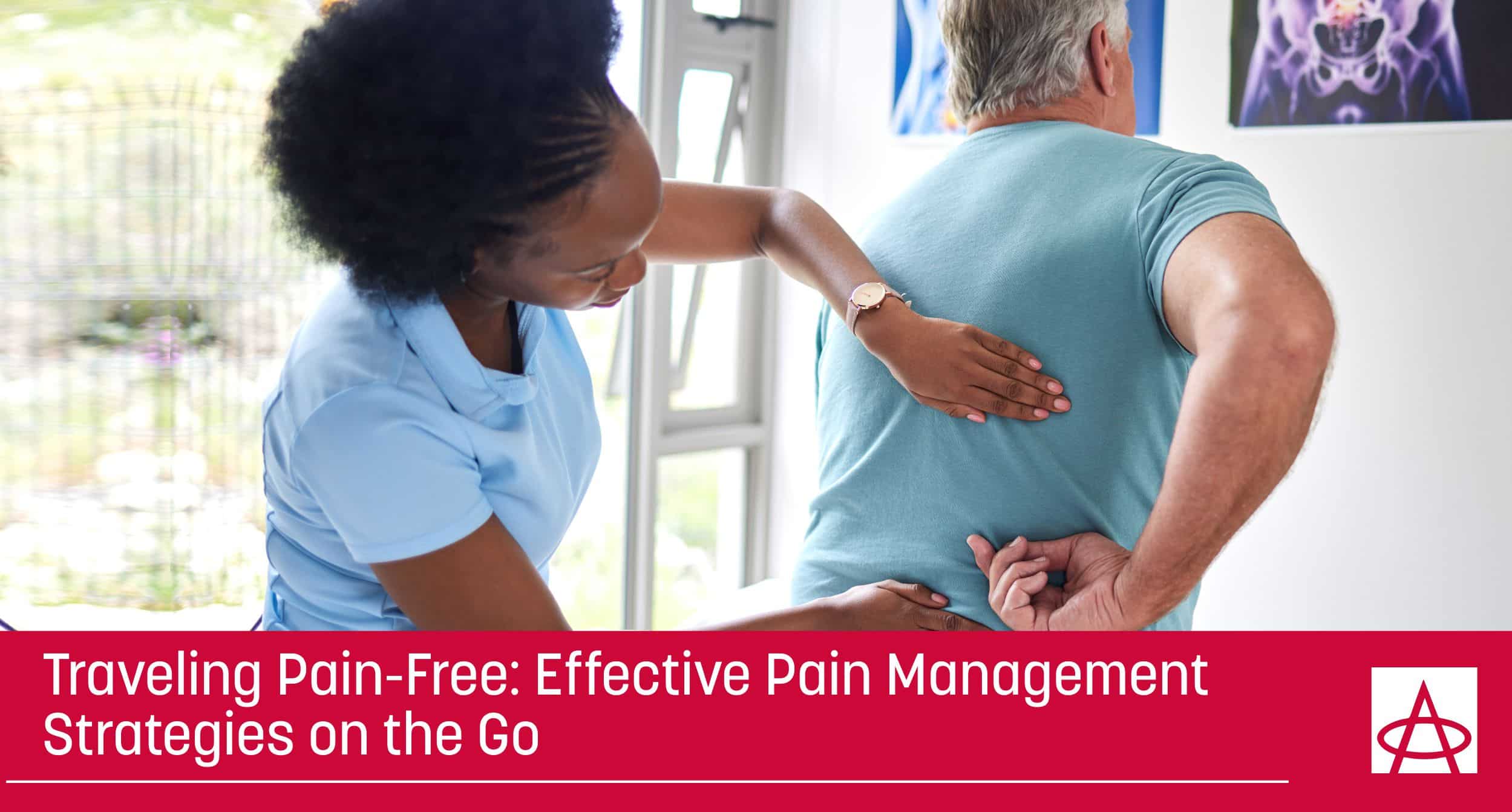
Traveling Pain-Free: Effective Pain Management Strategies on the Go
Traveling is one of life’s greatest joys, but dealing with pain along the way—whether from sitting too long, lifting luggage, or moving around—can make it hard to enjoy. However, with a bit of preparation and a few adjustments, pain-free travel is possible. You can embrace the excitement of your journey without the discomfort, feeling energized and ready for every adventure.
Understanding the common causes of pain while traveling allows you to take proactive steps. Typical pain triggers during a trip may include:
- Sitting for extended periods of time in cramped spaces like planes or cars
- Lifting heavy bags, straining your back and shoulders
- Travel stress leads to tight muscles
- Poor posture from prolonged sitting or standing Lack of movement, causing stiffness or discomfort
- Dehydration during travel, resulting in muscle cramps and headaches.
Types of Pain You May Experience While Traveling
Traveling can bring on different types of pain that may affect your trip. Here are some pains you might feel:
- Cramps: Sitting for a long time, such as in a car or on a plane, can lead to muscle cramps. Not getting enough water or essential nutrients like potassium or calcium may make cramps worse.
- Knots: Muscle knots can form due to stress, poor sleep, or sitting in uncomfortable positions. These knots often occur in the neck, shoulders, and back.
- Numbness: Extended pressure on nerves, common during long flights or road trips, can cause numbness or a pins-and-needles feeling, especially in the legs or feet.
- Spasms: Muscle spasms happen from tiredness, dehydration, or imbalances in electrolytes. Carrying heavy luggage can also trigger muscle spasms.
- Suitcase Spine: Lifting heavy bags can strain your spine and cause pain in the back and neck, often referred to as “suitcase spine.”
Understanding these common pain triggers helps in managing and preventing discomfort during travel.
Read on to explore tips by pain management specialists at Advanced Pain Care for traveling comfortably.
Pre-Travel Preparations for Pain Prevention
Here are some practical strategies to prepare effectively before your trip:
Choose the Right Luggage
Selecting the right luggage can significantly help manage pain. Opt for lightweight, easy-to-handle luggage with wheels to minimize back strain. Backpacks with good support can also evenly distribute weight, reducing the risk of muscle strain.
Pack Smart
Avoid overpacking your luggage by bringing only essential items. Use organizers to distribute the weight evenly, and aim to keep your bag’s weight within 10% of your body weight to help prevent back and shoulder strain.
Stretch Before You Travel
Incorporate stretching exercises into your pre-travel routine to boost blood circulation and improve flexibility, reducing the risk of cramps and muscle stiffness. Prioritize stretches for your neck, back, and legs to prepare your body for long periods of sitting, ensuring a more comfortable journey.
Talk to Your Doctor
Before you travel, consult with your healthcare provider for personalized interventional pain management, especially if you have chronic pain conditions. Also, discuss any medications or supplements you may need to manage pain effectively during your travels.
If you’re in Central Texas and searching for “pain management doctors near me,” specialists at Advanced Pain Care can help. Our advanced pain management team can give detailed guidance on effective pain relief techniques.
How Can You Relieve Body Aches After Traveling??
After traveling, it’s common to experience body aches due to sitting for long periods, lifting heavy bags, and changes in your routine.
- Sleep – Rest is one of the most effective ways to recover from travel-related aches. Aim for at least eight hours of quality sleep each night to allow your body to heal from the physical stress of traveling. If you’re jet-lagged, short naps can also be helpful.
- Hydrate – Drink plenty of water and keep yourself hydrated to help minimize muscle soreness and fatigue. Try to reduce your intake of caffeine and alcohol, as they can lead to dehydration.
- Stretching and Exercise – Gentle stretches and low-intensity exercises can relieve muscle stiffness. Activities like walking or swimming help keep you flexible and reduce tension. Incorporate stretches for your legs, hips, and back to address common areas of discomfort.
- Healthy Eating – A balanced diet supports your body’s recovery and helps reduce inflammation. Focus on nutrient-rich foods that promote muscle repair and overall health to help your body bounce back more effectively.
- Warm Bath or Shower – Warm water relaxes tight muscles and can provide relief after a long trip. Adding Epsom salts to your bath can enhance the soothing effect, as magnesium helps relax muscles.
- Heat or Cold Therapy – Apply heat or cold packs to sore areas. Heat therapy can relax tight muscles, while cold therapy can reduce inflammation and swelling.
- Massage – A professional massage can reduce muscle tension and promote relaxation. If a professional massage isn’t feasible, self-massage tools like foam rollers or massage balls can also be effective.
- Pain Relievers – OTC (Over-the-counter) pain relievers like ibuprofen can help alleviate discomfort. However, it is important to consult a pain treatment center to determine the most appropriate medicines for your specific condition.
Employing these strategies can help prevent the development of acute or chronic pain following your travels.
Conclusion
Traveling with chronic pain doesn’t have to be a challenge. At Advanced Pain Care, we specialize in providing solutions for dealing with back pain, neck pain, and any type of physical aches. Our interventional pain management techniques can help you stay comfortable and active while on the go.
So, are you ready to make your next trip pain-free? Book your appointment at our pain management clinic. Contact us today!

